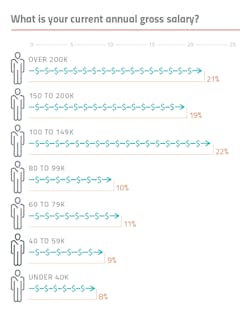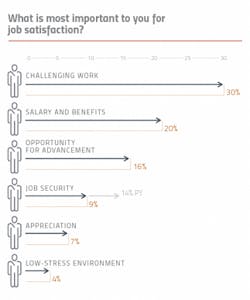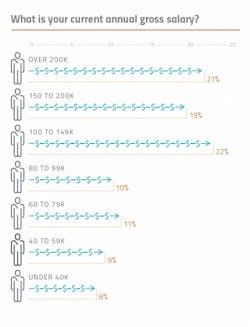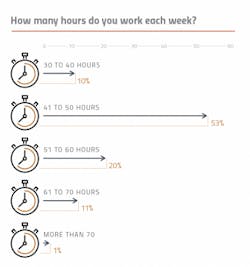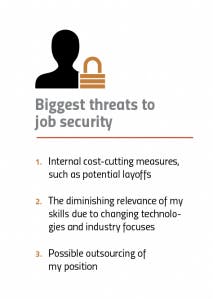As a kid, I remember seeing suggestion boxes in places like restaurants and thinking about how much fun it would be to sit down and read through what people said when given the chance to share their anonymous thoughts
Now in the age of Yelp, Google reviews, Glassdoor, and the many other business-reviewing platforms, public opinions are very easy to find. But when anonymity is provided, what are people really thinking?
Lucky for my inner child, I was tasked with our 18th consecutive annual Career and Salary Survey, which felt the same — if not way better — than reading through the local diner’s suggestion box.
For nearly two decades, Pharma Manufacturing readers have helped us paint a landscape of the professional and emotional reality of working in the pharmaceutical industry. We’ve also been able to study these trends and speculate on how they reflect where the industry is headed.
While priorities and dynamics have shifted, pharma folks continue to be happy and driven by meaningful work.
Here is what changed, what stayed the same, and what we think this can tell us about the future of pharma.
Pharma’s joy remains mostly untouched
It's safe to say pharma is overperforming in this department. More than 89% of our respondents this year said they feel satisfied within their current roles, with happiness levels ranging from ‘okay’ to ‘very high.’ According to a study led by The Conference Board, general job satisfaction in the U.S. surged to an all-time high during the pandemic, reaching almost 57% between November of 2019 and 2020.
And it’s not an easy time to be a professional in the industry either. The responsibility to discover and develop drugs that will return the world to normalcy is unique to pharma.
But this hasn’t seemed to scare anyone yet. In fact, this added pressure might be making the work more meaningful. For the past two years, challenging work had lost out to salary and benefits as the top driver of job satisfaction for our survey respondents. This year, that changed — challenging work reclaimed the throne as the top answer, with 30% of participants saying this was the most important factor for job satisfaction.
In write-in prompts, our respondents reflected this sentiment when asked what brought them the most joy about their current jobs. Respondents cited highlights such as “participating in solving of real problems” and “being challenged in what I do.”
Lucky for them, there are plenty of complex problems that pharma can help mitigate.
Let’s talk moneyWhile the last few years have brought endless challenges, the urgency to end the pandemic has also opened the money flood gates and pushed drug developers to give their best in record time.
And their best has been profitable, as the total global revenue of pharma in 2021 was $1.26 trillion.
Despite the profitability of the industry, the number one concern felt by (the albeit small amount of) respondents who were concerned about job security was internal cost-cutting measures, such as potential layoffs.
This profitability doesn’t seem to be reflected in salary increases either. Since 2020, there’s been a steady decline in reports of raises. This year, 54% of respondents reported receiving a salary increase, down from 67% in 2019. About a third of those receiving raises reported salary increases in excess of 5%.
However, all is not lost: 62% of respondents reported receiving a bonus or additional incentive, such as extra time off or stock options.
And even though raises are in decline, pharma salaries are still highly competitive when looked at in the bigger picture. This year, 73% of our respondents reported having a gross annual salary of 80k or more, while the average earnings for full-time workers in the United States amounts to $52K.
From the data we gathered, most respondents are making more than 100k a year, with 20% making over 200k.
Work-life balance?
Similar to professionals throughout many industries the U.S., those is pharma are finding themselves putting in extra hours.
Over 85% of respondents said they’re working more than a 40-hour week this year, rising slightly from 82% last year.
And according to the American Time Use Survey led by the U.S. Bureau of Labor Statistics, between May of 2019 and July of 2021 American workers worked an average of 4.5 hours a day and 42.5 hours a week.
On the bright side, stress levels have stayed fairly consistent over the years, with most respondents (just under half) saying they only feel overly stressed 'some of the time' and 19% reporting rarely or never feeling stressed.
Another continued trend the survey showed regarding work-life balance is that fewer people use all their vacation time. This year, 61% of respondents said they did not use all their 2021 PTO, compared to 56% last year. This percentage has risen steadily since 2016 when about 46% reported failing to take all allotted vacation time.
It’s an employee’s world
Despite how grim this picture might look, power dynamics are shifting.
Pharma professionals appear to be living in an employee market — employees reported decreasing worry over job security. In fact, the importance placed on job security when it comes to job satisfaction is at an all-time low since we’ve been gathering responses for this question.
This year, only 9% of respondents placed utmost importance on their job security over other things such as salary and benefits or opportunities for advancement.
This is not a surprise, considering we’re going through what experts are calling 'The Great Resignation,' with people leaving their jobs in record numbers. This exodus of professionals is putting on strain in all industries, and pharma is no exception.
This year, staff shortages due to resignations were the third leading cause of stress for our respondents. We’ve seen this is impacting the pharma supply chain from drug ingredient shortages to regulatory inspection challenges.
Recently, the Government Accountability Office (GAO) has asked the U.S. Food and Drug Administration (FDA) to work on their international inspection backlog, which was mainly caused by a staff shortage as well.
What is causing this mass resignation? According to the World Economic Forum, industries with low location and time independence suffer the most, and business models in which time and location proximity of employees is necessary, often fail to keep up with the digitalization of the world.
Although not everyone is bailing completely — some workers have made the decision to seek new opportunities within their own companies. This year, 27% of our readers reported having a new role or position internally.
The push of the digital age could also be causing an increase in the number of workers who are concerned with skill relevance. In this year’s survey, 24% of workers said that the diminishing relevance of their skills due to changing technology was the greatest threat to their job security, a staggering difference from 7% in 2021.
The not-so-great stuff
Working longer hours, having unclear expectations, and feeling an increased concern over skill obsoletion were among the negative trends reported this year. Respondents also mentioned issues such as:
Lack of feedback — One of our questions asked respondents if they had received meaningful feedback this year, and 40% said no. “Management isn’t involved enough to understand the projects and challenges but is critical when they see something they don’t like.” “Top management doesn’t communicate well. They make the job more stressful.”
Confusing priorities — “No direction and time. No clarity of the expectation of the role.”
Internal struggles — Our respondents did not shy away from sharing their frustrations with internal politics and heightened stress environments mentioning grievances like having a “Lack of internal support,” or feeling unheard and needing to “Fight to get a seat at the table.” When asked what was the biggest challenge faced in their current role, 38% of our respondents mentioned struggles with internal management.
Feeling good
More people are receiving meaningful feedback and formal training and feel challenged and inspired by what they do. Other positives mentioned included:
The people — “I work with very smart people who work very well together. We work well together to meet our goals. Those goals move us in the direction of our mutual aim which is ultimately to help people live better lives.” Another respondent said, “The people I work with are great.”
Meaningful work — One of the biggest takeaways this year is that pharma folks prioritize meaningful, challenging work. One respondent mentioned, “It's rewarding to make good money working well with people you like and who respect you, all while working towards something noble.” “Scope of work and opportunity to make an impact,” said another.
Flexibility — “I am empowered to do my work without micromanagement. I know I can go to my current manager when needed.”
